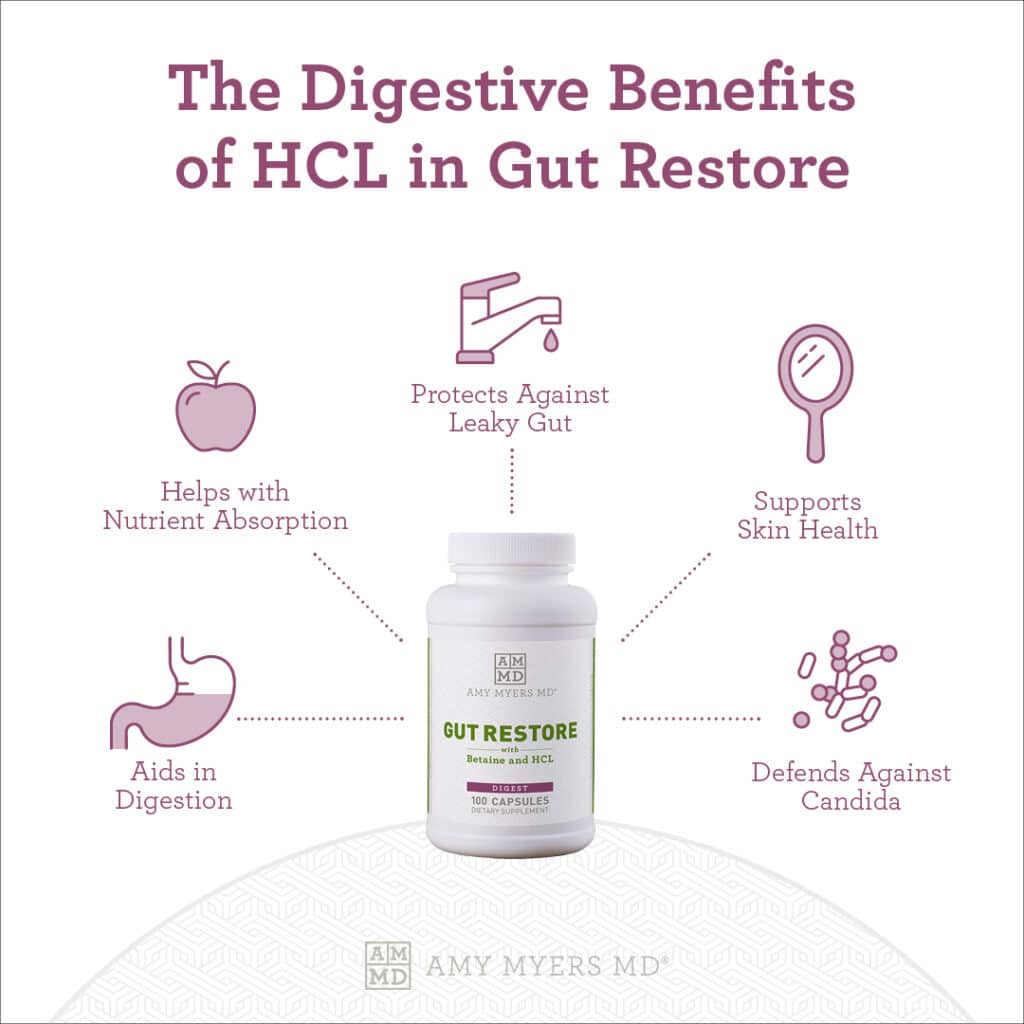HCL. You might recognize those letters from your high school chemistry class as hydrochloric acid – a potent, highly corrosive, and pungent chemical. You may not know that your gastric juices also contain a form of HCL to aid digestion by helping break down the food you eat. There are many benefits of Gut Restore with Betaine and HCL for your digestive health, and I will tell you about them later.
Your body’s natural HCL production diminishes as you age. Without HCL in your gastric juices, you could experience a host of uncomfortable symptoms such as bloating, gas, heartburn, and even poor nutrient absorption. Over time, low HCL production can lead to other health issues, including autoimmune disease.
I’m going to tell you what causes low stomach acid, how it impacts your health, and the benefits of Gut Restore with Betaine and HCL to boost your stomach acid levels for better gut health, healthier skin, and optimal nutrient absorption. First, let’s have a review of hydrochloric acid.
What is Hydrochloric Acid?
If you took chemistry in high school, you probably learned hydrochloric acid is corrosive and could cause severe chemical burns if it comes in contact with your skin. You likely wore protective gear and took safety measures when working with hydrochloric acid in chemistry labs. Common end uses for hydrochloric acid include household cleaners, pool maintenance, and food manufacturing.
I don’t want you to worry. The type of hydrochloric acid you used in chemistry class or found in household cleaners is a synthetic form combined with hydrogen chloride gas.
The natural form is the main component of gastric acid naturally found in your stomach. The hydrochloric acid found in your stomach acid is very beneficial to the digestion of the food you eat, and that’s because of HCL’s alkaline properties. Let me explain.
Your stomach should be naturally acidic to kill harmful bacteria and microbes that disrupt the natural balance in your gut. HCL also supports your immune system by killing viruses once they reach the stomach, so they don’t make their way into the small intestine and, eventually, the bloodstream.
It takes a lot of energy for the cells in your stomach to produce HCL. If they don’t have the energy to generate enough HCL due to a diet full of processed foods, gluten, and dairy products, it can lead to hypochlorhydria. I’ll talk more about this in just a bit! First, let’s discuss the benefits of Gut Restore with Betaine and HCL.
 Dr. Amy Myers
December 11th, 2022
https://content.amymyersmd.com/article/betaine-hcl/
Dr. Amy Myers
December 11th, 2022
https://content.amymyersmd.com/article/betaine-hcl/What are the Benefits of Gut Restore with Betaine HCL?
If you glance at the ingredients in an antacid, it’s a pretty safe bet it contains betaine HCL. Gut Restore with Betaine and HCL supports the stomach’s natural acidic levels. Betaine hydrochloride is in sugar beets and many plants. This powerful herb supports nearly every digestive process in the stomach, promoting normal acid levels. Here are the benefits of Gut Restore with Betaine and HCL:
Gut Restore with Betaine and HCL Supports Digestion
Your body expends an immense amount of energy digesting the foods you eat. Without optimal stomach acid levels, your body has to work overtime which often causes low energy and even fatigue. Gut Restore with Betaine and HCL promotes stomach acid levels so your body can break down food in the stomach, making it easier to absorb nutrients more efficiently in the small intestine. It also helps kill off harmful bacteria in your stomach before they have a chance to enter your digestive tract.
Gut Restore with Betaine and HCL Heals Leaky Gut
Adding Gut Restore with Betaine and HCL to your routine maintains an ideal balance of acidity in your digestive system, which supports your vulnerable gut linking. Gut Restore with Betaine and HCL creates an inhospitable environment for harmful microbes, yeast, and bacterial and fungal infections. It helps protect you against the effects of leaky gut syndrome by supporting protein digestion.
Without enough HCL to break down proteins, tiny undigested particles may leak into your bloodstream. Your immune system doesn’t recognize these particles and begins to attack them. Without addressing your leaky gut, undigested particles entering your bloodstream puts your immune system on high alert, and it responds by attacking everything in sight, including healthy tissue.
Gut Restore with Betaine and HCLStops Candida Overgrowth
Supplementing with Gut Restore with Betaine and HCL inhibits Candida overgrowth, preventing it from accumulating in your small intestine. Maintaining a healthy acidity in your stomach helps your digestive tract digest your food correctly, preventing undigested food from sitting in your stomach and feeding the Candida that disrupts your gut flora. If you have both Candida overgrowth and leaky gut, the Candida can escape through your intestinal wall and create a widespread systemic issue.
Gut Restore with Betaine and HCL Promotes Skin Health
Your gut health is tied to the health of your skin. Many common skin conditions, such as eczema, dermatitis, acne, and rosacea, are linked to low stomach acid.1 Supplementing with HCL can indirectly support your skin health by promoting healthy stomach acid levels.
Gut Restore with Betaine and HCL Supports Nutrient Absorption
Your body cannot absorb the nutrients from your food without healthy stomach acid levels. Nutrient deficiencies and poor nutrient absorption can lead to unintentional weight loss, fatigue, muscle wasting, digestive issues, dull hair, brittle nails, loss of bone density, and many other health conditions. Gut Restore with Betaine and HCL boosts your stomach acid to ensure your body can utilize all the nutrients you eat!
As mentioned, Gut Restore with Betaine and HCL supports healthy stomach acid levels. So, what happens when your stomach acid gets too low? This is known as hypochlorhydria.
What is Hypochlorhydria?
Hypochlorhydria is the medical term used for low stomach acid. Earlier I mentioned that low stomach acid could cause leaky gut and Candida overgrowth since it inhibits your body’s ability to kill harmful bacteria.
When your body can’t properly digest food and absorb nutrients over a long period, you are at a higher risk of malnutrition, gastrointestinal disorders, leaky gut, and the overgrowth of Candida.
Hypochlorhydria damages your gastrointestinal system, causing gut infections and other chronic health conditions if left untreated. Here are the symptoms of hypochlorhydria:2
- Heartburn
- Gas
- Bloating
- Fatigue
- Iron deficiency anemia
- Vitamin and mineral deficiencies
- Hair loss
- Undigested food in your stools
- GI infections
If you suspect that you have hypochlorhydria, you may want to test your stomach acid levels at home using the baking soda test. To do this, you’ll combine 4 ounces of water with a quarter teaspoon of baking soda and drink it on an empty stomach. The combination of baking soda and stomach acid will produce carbon dioxide and cause you to belch soon after drinking the mixture. However, if it takes longer than 3-5 minutes for you to burp, you may have low stomach acid.
To confirm, you can schedule a visit with your functional medicine physician to run a few stomach acid tests for a formal diagnosis. The good news is that a solution is in your control. I’ll talk more about my go-to solution for low stomach acid in just a minute! First, let me tell you what causes hypochlorhydria.
What Causes Hypochlorhydria?
There are many potential underlying causes of hypochlorhydria. Gastritis often has underlying causes such as autoimmune disease, chronic overconsumption of alcohol, and bacterial infection. Some additional causes of hypochlorhydria include:3
- A poor diet full of processed foods
- Lack of exercise
- Smoking
- Overexposure to toxins
- Advanced age
- Use of NSAIDs or antibiotics
- Food sensitivities
- Hormonal changes
There are many reasons why you could have low stomach acid. Getting to the root cause of your low stomach acid is the first step in supporting your digestive health. That’s why I recommend Gut Restore with Betaine and HCL to anyone with a gut infection or digestive problem. Yet, you might be wondering if betaine HCL supplements are safe. Let’s talk about that.
Are HCL Supplements Safe?
Anyone concerned about leaky gut, wanting to support healthy pH in their digestive system, needing additional digestive support, or dealing with gas, bloating, and nutrient deficiencies could benefit from HCL supplementation.
Gut Restore with Betaine and HCL optimizes the pH levels of your stomach, adding just the right amount of acid to your gastric juices. As a result, this will support optimal digestion, mineral absorption, enzyme activation, and microbe balance.
Acidic beverages such as apple cider vinegar and lemon juice are also known to increase stomach acid levels. However, consuming them in liquid form could cause issues if you have a gut infection. It can also cause esophageal pain and discomfort, which is where betaine HCL supplements can be beneficial.4
What is the Solution?
As I mentioned, HCL supplements can be beneficial in supporting the digestive process. However, not all HCL supplements work or contain betaine. A high-quality HCL supplement should be in the form of betaine HCL. This is essential for optimal nutrient absorption and digestion and for preventing conditions such as leaky gut and bacterial overgrowth.
I formulated Gut Restore with Betaine and HCL to ensure the highest quality of ingredients, including 648 mg of betaine hydrochloride (or betaine HCL). I made sure to include optimal amounts of betaine HCL to promote optimal gastric acidity, support the breakdown of protein into constituent amino acids, and facilitate the activation of pancreatic enzymes. Gut Restore with Betaine and HCL adds just the right amount of acid to your digestive system to optimize pH levels in your stomach acid.
For maximum support, I recommend taking HCL with Complete Enzymes for optimal digestive health. Complete Enzymes offer a broad spectrum of digestive enzymes to maximize nutrient absorption, support a healthy inflammatory response, and break down proteins.
The Final Word
Hydrochloric acid, or HCL, is so essential for proper digestion of the food you eat that nearly everyone would benefit from a betaine HCL supplement. Your gut is the pathway to achieving optimal health. If you notice digestive issues such as gas and bloating, chances are you have low stomach acid. Adding Gut Restore with Betaine and HCL to your daily routine supports healthy stomach acid levels.
Article Sources
- Rosacea: Molecular Mechanisms and Management of a Chronic Cutaneous Inflammatory Condition. Yu Ri Woo, Ji Hong Lim, et al. International Journal of Molecular Sciences. 2016.
- Hypochlorhydria. Cleveland Clinic. 2022.
- Gastrointestinal Tract and the Control of Bone Mass. Thorsten Schinke and Michael Amling. Science Direct. 2013.
- Gastric Re-acidification with Betaine HCl in Healthy Volunteers with Rabeprazole-Induced Hypochlorhydria. Gillian S. Smelick, Lynda A. Frassetto, et al. Molecular Pharmaceutics. 2013.
